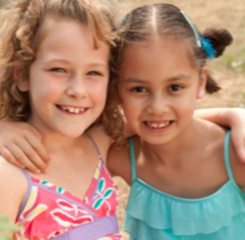
I spend most of my time talking about how to protect children from child sexual assault, but it’s equally important to focus on children who may be acting out sexually themselves and how parents can support them and find help. You may think this blog post is not relevant to your family, but please consider that one-third to one-half of all sexual offenses in the United States are committed by youth – and that each time a child is touched inappropriately by another child, both of those children are someone’s kids and need our support.
Is your child at risk of sexually harming another child? What are the signs?
Warning Signs That Youth Might Sexually Harm Others
More than one-third of child sexual assault against minors is committed by juveniles.1 Ages 12- 14 are peak years for sex offenses against younger children2, but children as young as five, six and seven sexually act out on other children.
Children, particularly younger ones, may take part in inappropriate interactions without understanding how it might be hurtful to others. For this reason, it may be more helpful to talk about a child’s sexually “harmful” behavior rather than sexually “abusive” behavior.
A child or teen may be at risk of harming another child if they display certain characteristics:
- Confusion about social rules and interactions – e.g., Seeks out the company of younger children and spends an unusual amount of time with them rather than with peers.
- Anxiety, depression or otherwise seeming to need help – e.g., Was physically, sexually, or emotionally assaulted and hasn’t been offered adequate support.
- Sexual impulsivity or aggression – e.g., Links sexuality and aggression in language or behavior; views sexual images of children on the Internet.
Youth who sexually engage in harmful behavior do so for different reasons. Some, but not all, have experienced trauma: Sexual, physical, emotional, or severe neglect; some act from impulsivity and struggle with social skills; and some feel fear, anger and loneliness, and express it through sexual bullying. Here are two warning signs that a child may be acting out sexually:
- Children who talk about or simulate adult sexual acts beyond what is age appropriate. (See below to learn more about age appropriate sexual behavior.)
- Children who engage in sexual activity with a child three to four years younger, which in most states is reportable.

Age-Appropriate – or Not
Sometimes it can be difficult to distinguish between developmentally appropriate behavior and normal sexual experimentation versus sexually harmful behaviors. “Normal” sexual play tends to have the following traits:
- The sexual play is between children who have an ongoing mutually enjoyable friendship.
- The sexual play is between children of similar size, age, and social-emotional development.
- The play is lighthearted and spontaneous.
- When adults set limits, children are able to follow the rules (e.g., keep their clothes on at day care).
- Interactions are free from shame, blame, secrecy, coercion or manipulation.
- The interaction is 100% consensual.
Consider these examples and see if you can discern the difference:
- You go into your child’s bedroom where he and his friend (both five) are sitting naked talking about their penises. Is this age appropriate?
- Your four-year-old tells another four-year-old to get onto his mat at naptime and touch his penis – or else. Is this age appropriate?
- Your six-year-old and her eight-year-old friend are playing house and pretending to get married. They are hugging and kissing. Is this age appropriate?
- After the eight-year-old friend leaves, your daughter tells you that while playing house, the eight-year-old friend put her tongue in her month. Is this age appropriate?
- You learn that your five-year-old and her friend put their mouths on each other’s genitals. Is this age-appropriate?
- Your fifteen-year-old tells you that his girlfriend forced him to engage in oral sex and he did so without explicit consent. Is this age appropriate?
You’re Concerned – What to Do?
Whether your child is initiating sexually concerning behaviors with other youth or has been a victim of sexual assault by another youth, you may be scared, confused and feeling shame and overwhelm. Still, it’s important to intervene early and get help before behaviors escalate. Many children who sexually act out don’t understand their behavior is harmful and require guidance. It takes courage to ask for help if your child has harmed another – and here’s the good news: Most children and youth who receive adequate intervention, can learn appropriate boundaries.
Consult the following resources and find a qualified therapist who can help your child learn healthy boundaries and appropriate behavior.
National Center of the Sexual Behavior of Youth (NCSBY) – Information and guidance.
What Happens Now: Facing Sexual Behavior Problems with Your Child (National Children’s Alliance) – Information and guidance.
Treatment for Youth with Problematic Sexual Behaviors (Child Molestation Research and Prevention Institute) – Therapy referrals.
Finding a Treatment Provider (Association for the Treatment of Sexual Abusers) – Therapy referrals. (Note: You can also go the atsa.com and click on Meet ATSA: Chapters.)
Children with Sexual Behavior Problems: Fact and Information Page (Association for the Treatment of Sexual Abusers)
I welcome your comments and questions.
1 Finkelhor, David and Ormrod, Richard and Chaffin, Mark. “Juveniles who commit sex offenses against minors.” Juvenile Justice Bulletin. 12/2009: Page 2.
2 Finkelhor, David and Ormrod, Richard and Chaffin, Mark. “Juveniles who commit sex offenses against minors.” Juvenile Justice Bulletin. 12/2009: Page 2.

Leave a Reply